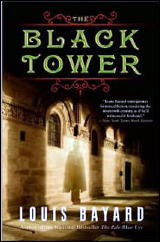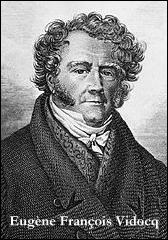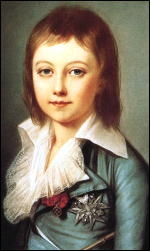Tue 10 Jun 2014
A Review by David Vineyard: LOUIS BAYARD – The Black Tower.
Posted by Steve under Reviews[2] Comments
LOUIS BAYARD – The Black Tower. William Morrow, hardcover, August 2008. Harper Perennial, paperback, 2009.
Eugene Francois Vidocq remains one of the most illusive and fascinating men in history. Convict, thief, fence, police spy, master of disguise, founder of the Surete, the first modern detective force, bestselling author, the first private detective, forensic pioneer in ballistics, fingerprints, and footprints, a man who escaped from every major penal institution in France, and the model for such literary giants as Poe’s Dupin, Balzac’s Vautrin, both Hugo’s Jean Valjean and Javert, and in spirit Sherlock Holmes.
He was gargantuan in size, appetites, genius, and ego. But he has always remained elusive in fiction, a figure so outlandish that the truth about him is too fictional to be believed or conveyed without testing the readers willing suspension of disbelief.
In Douglas Sirk’s film A Scandal in Paris with George Sanders as Vidocq they had to tone down the man’s character considerably, because no audience would have believed the truth.
In The Black Tower Louis Bayard has corrected that problem, giving us not only Vidocq in his full glory, but a mystery worthy of him, the hunt for the true fate of the dauphin, the heir to the throne of France — Louis Charles, Louis the Seventeenth, the child of Louis Sixteenth and Marie Antoinette — the lost king.
It’s a mystery that has resonated since the early half of the 19th Century. What happened to the ailing child imprisoned in the infamous black tower apart from his family, and doomed to die by the fanaticism of the French Revolution, the Jacobins, and the Terror? Other novels have dealt with it (Dennis Wheatley’s Roger Brook novel The Man Who Would Be King) and much non-fiction as well, but the questions are unanswered and likely remain so.
That hasn’t stopped Louis Bayard (Mister Timothy, The Pale Blue Eye) from weaving a magical literary thriller out of a spider silk of questions, legend, rumor, history, and Vidocq himself, one of the most fascinating men of his age. In addition to its other qualities it is also one other thing, a damn good detective story, featuring the world’s first detective.
It is 1818 and France, still reeling from the Revolution, Napoleon, and Waterloo, is in the midst of the Restoration of the throne upon which sits a new king. In the Paris of this turbulent time is one Hector Carpentier, a medical student languishing in his mother’s home, and about to find himself drawn into one of the great unsolved mysteries of all time.
It all begins when Vidocq, in disguise, shows up on Hector’s doorstep with a question, who was Monsieur Leblanc (surely a nod to the creator of Arsene Lupin, another Vidocq figure), the man murdered on the way to Hector’s home. Hector has no idea, nor any suspicion that he is being drawn into conspiracy from the past and the present that is as deadly now as it was then.
Though the mystery is compelling, the characters lively, and the setting superbly drawn everything in the book falls beneath Vidocq, a figure whose shadow at times seems to dominate all of France. Bayard’s portrait of him is one of the books great pleasures, his vivid descriptions of the man’s moods and styles forms a fascinating and vivid portrait of one of those historical figures who would have to have been invented if he didn’t really exist.
The mystery grows deeper: there is the Duchesse d’Anguoleme, the dauphin’s sister, who survived the Terror but feels guilt about abandoning the young Louis and her mother; the Baroness de Preval, widow of the Austrian ambassador who begins the hunt for the dauphin and who has secrets of her own, the new king of France who is willing to kill to keep his throne; Charles Rapskeller, a young man who may well be Louis; Herbaux the assassin; and three men, one of them Hector’s father, who took pity on a sick child held in a block tower and now from the grave may restore the rightful king of France.
There seems a new twist or mystery at every turn. Hector and Vidocq play each other each for their own goals while establishing a deep friendship, as secrets are revealed that turn the very tide of history, for no one is more anxious to find the true dauphin than his mother … Marie Antionette.
There is no shortage of mystery, action, escape, suspense, heart, or fascination in the novels rapid paced but carefully drawn plot, and Bayard’s prose and turns of phrase are a delight to read:
And here his fingers form a bud round his mouth and the name flowers forth, like a shower of pollen.
“Vidocq.â€
“If you have another lost king to peddle, Madame, you’ll have to knock on someone else’s door.â€
“I’m peddling nothing,†she answers, the first touch of frost crisping her voice. “It was Leblanc who believed, not I. And if he was wrong,” she says, rising and fronting him, “May I ask why he is dead?â€
She waits, with great courtesy, for his answer. Then tilting her head in deference, she asks: “Surely, there would be no need to kill a man who was laboring under a delusion.â€
It is a delightful book, a truly great read in the tradition of Zafon, Perez Reverte, Eco, Matthew Pearl, and yes, though there is no locked room or miracle crime, John Dickson Carr. It is simply a superb old-fashioned book book, a page turning, mind and heart engaging, first class read, and at its center, one of the most fascinating mysteries of all time, not what happened to the dauphin; but Eugene Francois Vidocq himself.



June 10th, 2014 at 6:04 pm
Rafael Sabatini addressed these issue in The Lost King, however I have always chosen to believe that The Scarlet Pimpernel spirited that child out of France to safety in America, Austria, Switzerland, or some other haven.
June 12th, 2014 at 4:56 pm
Barry, my favorite version of this is Dangerous Exile with Louis Jordan, Keith Michele, and Belinda Lee. I particularly love the opening with Jourdan doing a Pimpernel rescuing the dauphin in a hot hair balloon.
Wheatley had the dauphin turned into such a vengeful monster after his ordeal Roger Brook drowns him rather than subject France to his rule.
The American claimant was a clockmaker. MGM’s Passing Parade even did a short about him.
No doubt that ‘demmed elusive’ Sir Percy Beat the Band though.